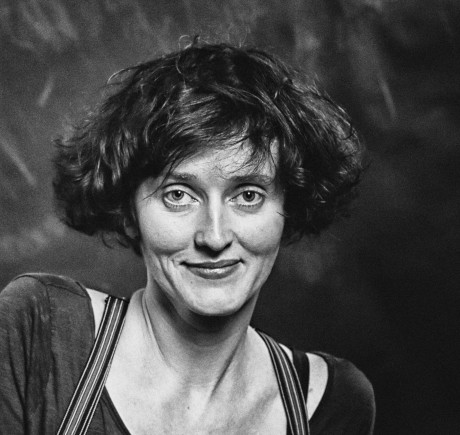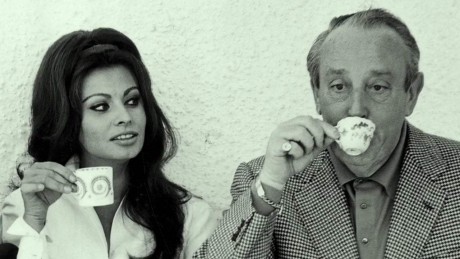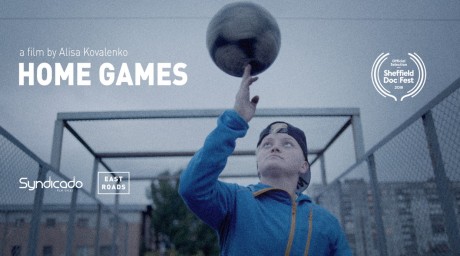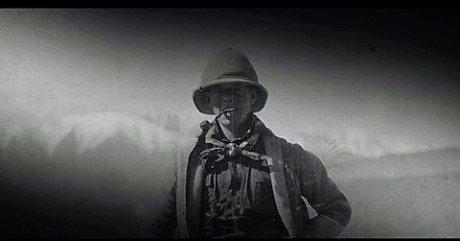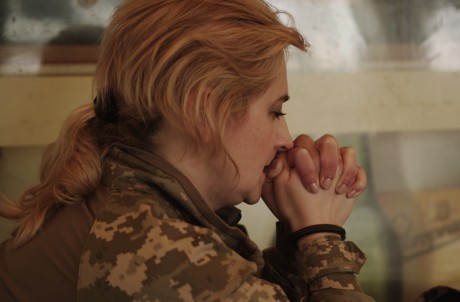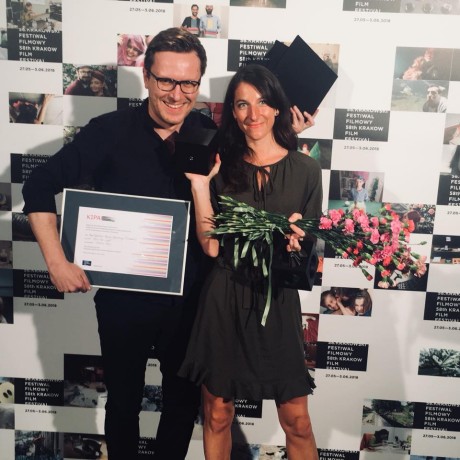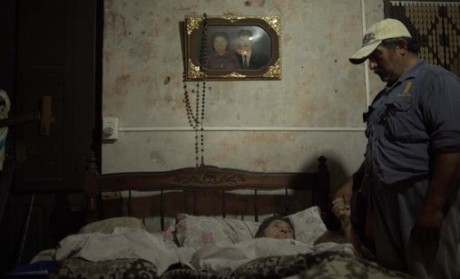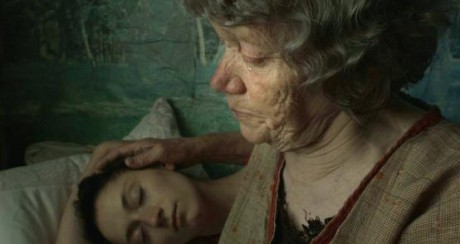Der er bografpremiere i morgen 6. juni og jeg knytter lige et par kommentarer yderligere til denne film, som optager mig en del:
2
Etnografen Henning Haslund-Christensen står på fotografiet midt på højslettens vældige tomme flade med bjergene i dis langt, langt borte. Fotografiet er fra en af hans mange rejser i Mongoliet.
Filmen begynder imidlertid ikke med ham, dens tid er ikke hans tid. Den begynder med Søren Haslund-Christensen og Michael Haslund-Christensen, hans søn og sønnesøn. I den allerførste scene er de i gang med et af deres talrige projekter, i filmens nutid at finde arkivstof til dens realisering. Søren står op ad en dørkarm i hjemmet: ”Skulle du ikke på loftet?” Kort pause. ”Det bliver måske først i morgen?” Den lille ironi er så velkendt, at den næsten overhøres, i klippet peger den direkte ind i familiehistorien, det første af filmens fortællelag. Michaels lette charme er svaret, han fortsætter leende med sit, der er ligevægt mellem de to, som charmen er en del af dem begge, den er en arv fra Henning, ligesom Sørens ironiske kommandotone vel måtte findes hos Henning dengang, han havde ledelsesfunktioner, og nu hos Michael som travl filmproducent. Hans beundring for faderen må underdrives til gang på gang at fremhæve, at faderen kan bevæge ørerne. Her på et still fra filmen er de på netop den mongolske steppe, hvor Henning var på sine ekspeditioner dengang. Snart vil de få brug for tricket at vippe med ørerne.
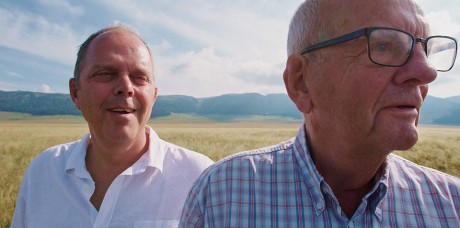
Deres rejse til Mongoliet i fortællingens nutid er en filmekspedition, som skal være rammen i Andreas Dalsgaards film, et fortællelag, som med udgangspunkt i familiehistorien linker til Henning Haslunds ekspeditionshistorie, til en historie om kulturtab og til en særligt bevægende skildring af et hukommelsestab i vente. I alt er der således fire, fem fortællelag, måske et par stykker mere, sindrigt elegant vævet til et billedtæppe med dialog, lyd og forunderligt nærværende musik, et filmessay over et århundredes ekspeditionsvidenskabelighed og mytologi.
Familiehistorien er ligesom helt Dalsgaards egen fortælling, jeg oplever den fra hans fortrolige position. Han bygger den på et stort og rigt familiearkiv af fotos og smalfilm og så på sit observerende kameras fortælling i filmens nutid. Her er fortællepositionen også, når der interviewes med andet kamera og i anden kamerastil. Optagelserne af samvær og interviews, altså begge slags er på helt samme måde intense og nærværende. Dertil er interviewene er klogt udførte i en diskret, men dyb empati.
3
Da jeg så filmen, var jeg i første omgang selv mest oplagt til det ekspeditionsmytologiske essay. Jeg kom lige fra arbejdet med Per Kirkebys film, hans rejser, hans forståelse af ekspeditionens væsen. Kirkeby fortæller, at han nu, han er i gang med den her film (Ekspeditionen, 1988) må erklære, at han har mistet lysten til det filmiske, at han vil fortælle om denne personligt skelsættende begivenhed, ekspeditionen i sit liv, som i hans sind vokser som drøm og forestilling og gennemtænkning til hele mytologien om ekspeditionerne i dette grønlandske landskab, hvor døden får sin ikke fortrængte plads, så livet bliver til fylde. Det vil han fortælle om i en lysbilledserie.
Og jeg forstår, at Teit Jørgensen er sat til at filme lysbillederne, mens Kirkeby viser dem med sit lysbilledapparat på lærredet og ind imellem med sin finger peger på en bestemt linje i det viste landskab, noget, han vil pointere, som han derefter i sit store værk, akvarellerne og malerierne atter og atter har pointeret. Film er for den rejsende Kirkeby først og sidst billeder.
Sådanne mytologiske billeddannelser var tidligere i mit liv tekster af Lennart Edelberg (Nuristan) og Klaus Ferdinand (Afghanistan) og Geoffrey Bibby og P.V. Glob (Bahrain) og Werner Jacobsen (Mongoliet) og af mine egne kolleger Torkil Funder (Ceylon, Oman) og Jens Vellev (Oman) og Bo Madsen (Israel og Irak). De fortalte og fortalte om etnografiske, arkæologiske og geografiske feltarbejder på arabiske og endnu fjernere asiatiske destinationer.
Selv har jeg aldrig rejst, kun i bøgernes digt, i Rider Haggards Afrika og i andre bøgers farverige nøgternhed som alle de polarrejsendes. Sidst var denne oplistning af navne og deres associationer ved at opleve Daniel Dencics rejse ind den kortvarigt isfrie nordgrønlandske fjord i hans film Ekspeditionen til verdens ende, 2013, som Michael Haslund skrev sammen med ham og producerede og som må være blandt forudsætningerne for Haslunds og Dalsgaards arbejde med Fædre & sønner, for en vigtig del af fremstillingen, nemlig den digteriske behandling af ekspeditionsmyten. Jeg bemærkede dengang jeg så Dencics film, at der et sted ikke langt inde, at døden i en stor rejses sammenhæng har mistet sin fortrængte plads. En kortfattet kvindestemme, Katrine Warsaaes høres med en pludselig og løsreven bemærkning med venlig og beskedent tilbageholdt pondus af viden om arters massedød tidligere i Jordens historie, men faktisk meget sjældent, med årmillioner imellem. Nu sker det måske igen, siger hun, en art er ved at uddø, denne gang ved at destruere sig selv, vi er måske midt i det.
Haslund og Dencik havde lavet en ung og opsætsig film med deres helte på rejse i et sejlskib frem mod verdens ende. Nu er navnene Jonas Bergsøe, Minik Rosing, Per Bak Jensen, Jeppe Møhl, Jens Fog Jensen, Tal R, Morten Rasch, Bo Elberling, Katrine Worsaae og Daniel Richter. De er om bord på skibet, de er ekspeditionens medlemmer, og de er filmens medvirkende, og små bidder af det, de siger til hinanden foran det observerende kamera, bliver efterhånden til filmens essayistiske udsagn.
Sådan forberedt ser jeg, at i Fædre & sønner etableres den videnskabeligt / kunstneriske / eventyrlige oplevelse i første omgang en del enklere ved at introducere en smuk empire kommode og dens indhold af hemmelighed og ved at give afgørende plads til blot to medvirkende vidner og researchere af fascinerende kvalitet, en dansk antropolog og en britisk historiker. Deres vildt spændende små bidder af viden og fortolkning vokser i et centralt detektivisk forløb til en regulær thriller om spionage og kontraspionage og våbensalg og våbentransport.
Og med det er filmen slet ikke færdig! Der er jo flere handlingstråde, som skal færdiggøres og knyttes. Man kan glæde sig: Der er DOXBIO biografpremiere i morgen, 6. juni 2018:
http://doxbio.dk/kob-billet/ (billetter i mere end 50 biografer)
http://doxbio.dk/movie-archive/faedre-og-soenner/ (trailer, synopsis, instruktørbiografi)
LITTERATUR
https://www.dfi.dk/viden-om-film/filmdatabasen/film/faedre-og-sonner-0 (synopsis og creditliste)
http://www.nordiskfilmogtvfond.com/news/interview/the-great-games-creators-on-letting-the-past-define-the-present (interview med Andreas Dalsgaard og Michael Haslund-Christensen)
http://www.filmkommentaren.dk/blog/blogpost/3358/ (om Per Kirkebys film)
http://www.filmkommentaren.dk/blog/blogpost/2282/ (anmeldelse af Daniel Dencic: Ekspeditionen til verdens ende)



